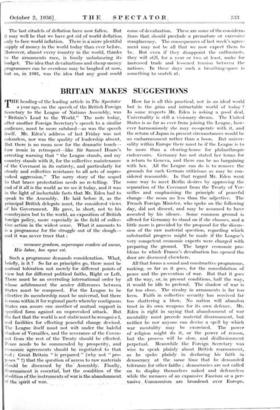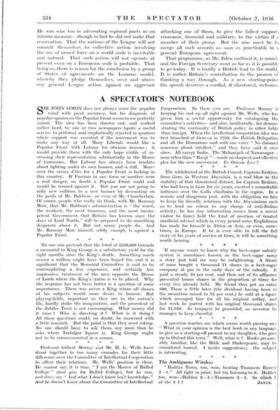BRITAIN MAKES SUGGESTIONS
THE heading of the leading article in The Spectator a year ago, on the .speech of the British Foreign Secretary to the League of Nations Assembly, was " Britain'S Lead to the World." The note today, after another Foreign Secretary's speech to a similar audience, must be more subdued—as was the speech itself. Mr. Eden's address of last Friday was not colourless, nor was the quality of leadership absent. But there is no room now for the dramatic touch— how ironic in retrospect—like Sir Samuel Hoare's arresting warning that " the League stands, and my country stands with it, for the collective maintenance of the Covenant in its entirety, and particularly for steady and collective resistance to all acts of unpro- voked aggression." The sorry story of the sequel to that brave protestation needs no re-telling. The end of it all is the world as we see it today, and it was in the light of ineluctable facts that Mr. Eden had to speak to the AsseMbly. He laid before it, as the, principal British delegate must, the considered views. of his aovernment. He gaVe, in short, not to his conntrymen but to the world, an exposition of British foreign policy, more especially in the field of collec- tive action in the widest sense. What it amounts to is a programme for . the Struggle out of the slough— and 'it was never truer that : . , • revocare,gradunu, superasque evadere ad auras, Ric-labor, hoc opus est. - - Such a programme demands consideration. What, briefly, is it ? So far as .principles go, there must be mutual toleration not merely for different points of view but for.different political faiths, Right or. Left. There must be an overruling international order by *hose arbitrament the acuter differences between States must be composed. For the League to be effective its membership, must be universal, but there is room within it for regional pacts whereby contiguous. States, can assure one another of mutual support in specified' form against an unprovoked attack. But the fact that the world is not static must be recogni.,_ei, and facilities for effecting peaceful change devised. The League itself must not wilt under the baleful shadoW of Versaillea, and the severance of the Coven- ant from the rest of the Treaty should be effected. Peake needs to be commended by prosperity, arid economic agreements should be negotiated to that. end ; Great Britain " iS. prepared ": (why not " pro- , poses " ?) that the question of access, to raw materials should be discussed by the Assembly. Finally, disarmainent is .essential; but the condition of the abolitiOn of the instruments of war is the abandonment, of the, 'spirit of war. How far is all this practical, not in an ideal world but in the grim and intractable world of today ? In some respects Mr. Eden is asking a good deal. Universality is still a visionary dream. The United States is as far as ever from joining the League, how- ever harmoniously she may co-operate with it, and the return of Japan in present circumstances would be an embarrassment rather than a boon. But univer- sality within Europe there must be if the League is to be more than a clearing-house for philanthropic endeavours. Germany has not stated her terms for a return to Geneva, and there can be no bargaining with her. All the League can do is to remove the grounds for such German criticisms as may be con- sidered reasonable. In that regard Mr. Eden went some way to meet Berlin desires by approving the separation of the Covenant from the Treaty of Ver- sailles and emphasising the principle of peaceful change—the noun no less than the adjective. The French Foreign Minister, who spoke on the following day, did not dissent, and may be assumed to have assented by his silence. Some common ground is offered for Germany to stand on if she chooses, and a little more is provided by the proposal for the discus- sion of the raw material question, regarding which substantial progress might be made if the League's very competent economic experts were charged with preparing the ground. The larger economic pro- blems to which France's devaluation has opened the door are discussed elsewhere.
All that forms a sound and constructive programme, making, so far as it goes, for the consolidation of peace and the prevention of war. But that it goes all the way, or, in present conditions, half the way, it would be idle to pretend. The shadow of war is far too close. The rivalry in armaments is far too keen. Faith in collective security has received far too shattering a blow. No nation will abandon trust in its own weapons for its own defence. Mr. Eden is right in saying that abandonment of war mentality must precede material disarmament, but neither he nor anyone can devise .a spell by which war mentality may be exorcized. The power of religion might do it, or the power of reason, . but the process will be slow, and disillusionment , perpetual. Meanwhile the Foreign Secretary was wise to speak plainly about British rearmament, as he spoke plainly , in declaring his faith in democracy, at the same time that he demanded toleranee for other faiths ; democracies arc not called On to.; display, themselves naked and defenceless while.the menaces of an expansive Fascism or a per- yasive Communism are broadcast. over Europe. He was wise too in advocating regional pacts as an interim measure—though in fact he did not make, that reservation. That the nations of the League will not commit themselves to collective action involving the use of armed force on a world scale is inevitable and natural. That such action will -not operate at present even on a European scale is probable. That being so, there is reason for the conclusion by a group of States of agreements on the Locarno model, whereby they pledge themselves, over and above any general League action against an aggressor attacking one of them, to give the fullest support, economic, financial and _military, to the victim if a member of their group. But the aim must be to merge all such accords as soon as practicable in a general European agreement.
That programme, as Mr. Eden outlined it, is sound, and the Foreign Secretary went as -far as it is possible to go today. It is 'hardly a British lead to the world. It is rather Britain's contribution to the process of thinking a way through. As a new starting-point the speech deserves a cordial, if chastened, welcome.











































 Previous page
Previous page